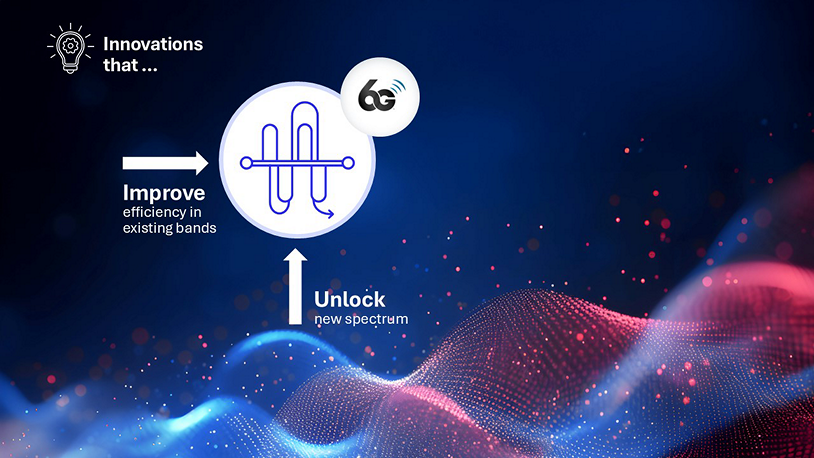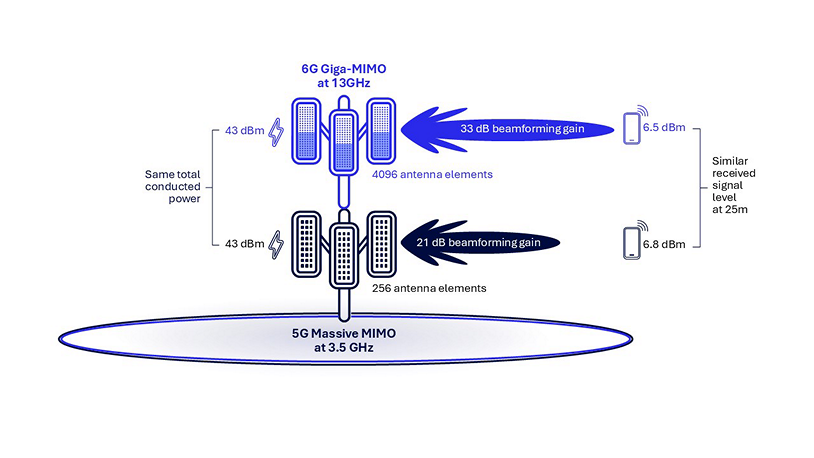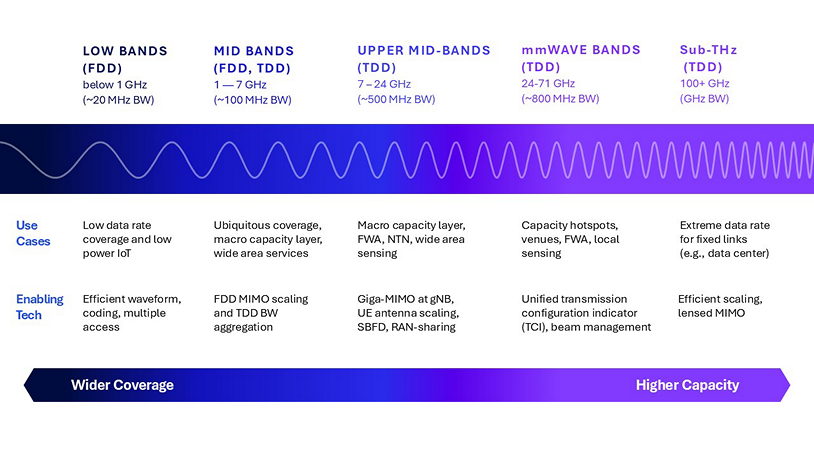As we march towards 2030, the relentless demand for wi-fi information is reshaping the panorama of connectivity. Assembly this demand requires a well-orchestrated technique to safe new spectrum and optimize present bands. The success of 6G, with industrial deployments anticipated to start out round 2030, hinges on the well timed availability of spectrum. Given the complexity of the spectrum allocation course of, initiating actions to make sure spectrum readiness for 6G are crucial and can’t be delayed.
A knowledge-driven period requires extra spectrum
Wi-fi connectivity has change into the spine of world digital transformation. The proliferation of smartphones, Web of Issues (IoT) gadgets and related automobiles — every supported by wi-fi broadband — has pushed a large surge in information consumption. In 2023, U.S. wi-fi information demand surged previous 100 trillion MB (greater than the overall consumption from 2010 to 2018 mixed) and marking a 2x enhance over 2021.1 Trying ahead, it’s anticipated that by 2030, international cell information visitors will quadruple, reaching a staggering 465 exabytes monthly, with a compound annual development fee (CAGR) of 23% from 2023.2
This surge is powered by key tendencies:
- the continued proliferation of 5G,
- enhanced video streaming high quality,
- the rise of prolonged actuality (XR),
- cloud gaming, and
- the rising prevalence of AI-driven functions and providers.
Notably, AI is reshaping information flows, with international wide-area community (WAN) visitors projected to develop 5 to 9 instances from 2023 to 2033. By then, AI will account for an estimated 33% of all WAN visitors.3
The continued rising demand for cell information underscores the important want for expanded spectrum availability and higher effectivity in its use. 6G is positioned to satisfy these challenges, unlocking new prospects in wi-fi innovation and advancing international connectivity.
Sustaining development by means of spectrum innovation
The emergence of 6G opens the door to transformative alternatives throughout all spectrum bands — low, mid and excessive. Qualcomm’s imaginative and prescient is to drive improvements that unlock new spectrum whereas enhancing the operational effectivity of present bands. This twin strategy creates cost-effective scaling of visitors capability, at the same time as new use circumstances emerge. 6G will use wider bandwidths within the higher mid-band spectrum vary (e.g., from 6-8.5 GHz) to allow high-performance functions like immersive prolonged actuality (XR) and generative AI, whereas enhancing effectivity in low and mid-band spectrum bands (under 6 GHz) to spice up protection and capability in these essential huge space protection bands.

Fostering sustained development and permitting new providers to really take off.
Laying the groundwork for brand new spectrum
Securing spectrum for 6G is a decade-long journey that’s already underway. Frequencies between 6 GHz and 15 GHz — often called the higher mid-band — have been recognized as prime candidates for 6G use. The Worldwide Telecommunication Union (ITU)’s World Radiocommunication Convention 2023 (WRC-23) have initiated research to determine bands inside this vary for 5G Superior and 6G. As an example, probably the most impactful agenda objects for WRC-27 entails the identification of a number of frequency bands, together with 4.4-4.8 GHz, 7.125-8.4 GHz and 14.8-15.35 GHz, for potential Worldwide Cell Telecommunications (IMT) use. As well as, many nations all through the world are planning to deploy IMT providers within the higher 6 GHz band (6.425-7.125 GHz).
Within the U.S., the Nationwide Spectrum Technique (NSS) has pinpointed the 7.125–8.4 GHz band for wi-fi broadband research. These efforts replicate a rising recognition of the higher mid-band’s potential to ship each wide-area protection and excessive capability, notably when paired with next-generation applied sciences like our Giga-MIMO. Giga-MIMO leverages superior antenna methods on each the bottom station and system to attain protection similar to in the present day’s 5G large MIMO within the decrease mid-band spectrum, additional enhancing the feasibility of the higher mid-band utilization for 6G.

Giga-MIMO: Assembly the capability calls for of the last decade to return.
Advancing spectrum effectivity
6G additionally represents a possibility to enhance the usage of present bands. By specializing in air interface design developments in foundational applied sciences reminiscent of waveforms, coding, modulating, MIMO, information and management channels, and multi-band service aggregation, 6G will allow transformative upgrades for each present and new bands:
- Low-Band spectrum (<1 GHz): Designed for decrease information charges, wide-area protection and energy effectivity, developments in waveforms, coding/modulation designs and a number of entry applied sciences will improve low energy IoT functions.
- Mid-Band spectrum (1–6 GHz): As a macro capability layer, mid-band improvements reminiscent of MIMO dimension scaling for FDD and bandwidth aggregation for TDD will optimize protection, latency and spectral effectivity to raised help wide-area providers.
- Higher Mid-Band spectrum (6–24 GHz): As a macro capability layer, the higher mid-band enabled by Giga-MIMO won’t solely optimize spectral effectivity and help wide-area protection providers, however it is going to even be complemented by improvements reminiscent of sub-band full duplex (SBFD), additional enhancing general effectivity.
- mmWave spectrum (24–71 GHz): Improvements like quick AI-driven beam administration and Giga-MIMO will improve capability in dense environments, effectively enabling multi-gigabit connectivity in venues, transportation depots, purchasing malls and dense city areas, and supporting mounted wi-fi entry (FWA). As well as, 6G built-in sensing and communication (ISAC) will allow new sensing use circumstances for native space protection.
- Sub-THz spectrum (100+ GHz): Focused at mounted hyperlinks requiring excessive information charges, developments like lensed MIMO will unlock use circumstances reminiscent of fronthaul and information middle communications.
By driving these improvements, Qualcomm is setting the stage for enhanced wi-fi effectivity, serving to to allow 6G to ship on its promise of improved capability, protection and efficiency. Try our most superior wi-fi R&D prototypes and know-how demonstrations, together with our 5G Superior and 6G improvements

6G will leverage all spectrum bands to serve various use circumstances and deployments.
The street forward
The race to outline and deploy 6G is intensifying. International locations and areas are investing closely in analysis, whereas standardization efforts are actively underway. On the coronary heart of 6G’s success lies the provision of spectrum — an enabler of technological progress and financial development.
With industrial deployments anticipated in 2030, the lengthy spectrum availability timeline underscores the urgency of present efforts. To remain forward, the cell trade should efficiently safe contemporary spectrum that meets the evolving wants of communication and capability.
The way forward for connectivity is being constructed in the present day, and Qualcomm is on the forefront of this transformation. From foundational air interface analysis to groundbreaking prototypes, we’re shaping a wiser, extra related world powered by 6G know-how.
Wish to be taught extra?
Be part of our webinar to be taught extra about 6G spectrum improvements
Be taught extra about our 6G imaginative and prescient
Join our wi-fi applied sciences e-newsletter to remain updated


